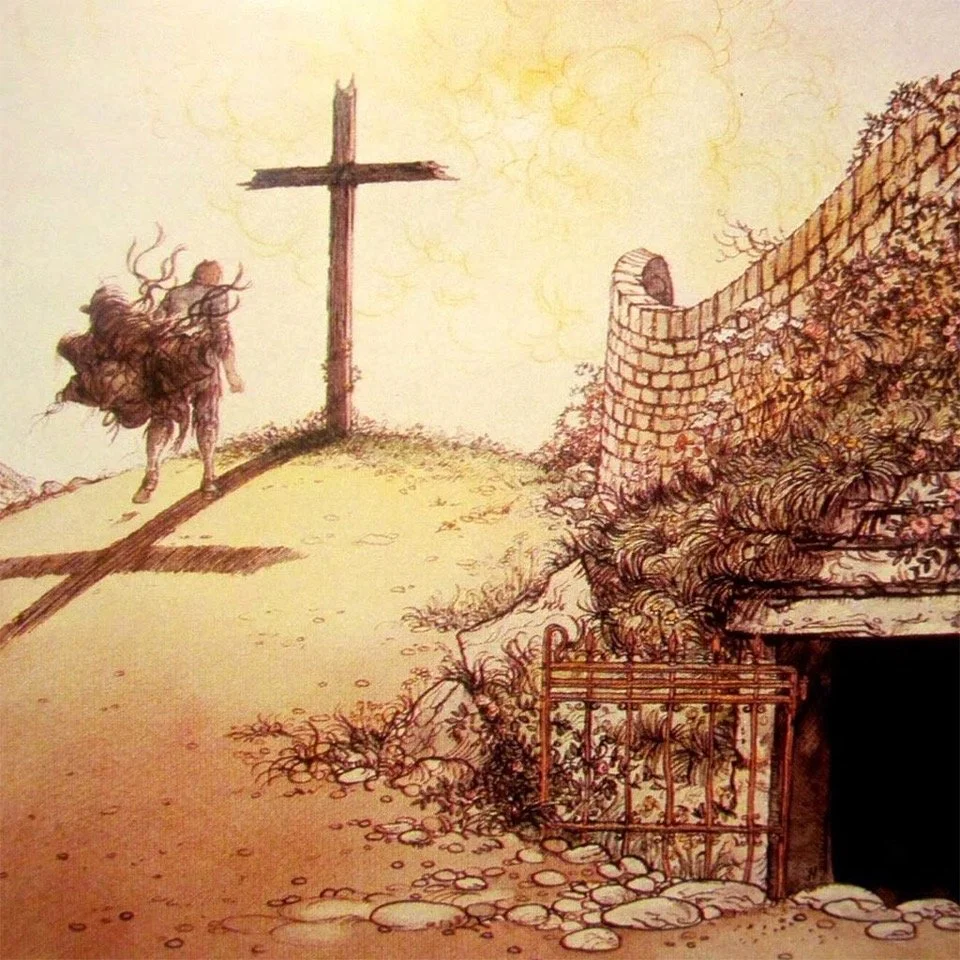Blessed Assurance: Is Jesus Actually Yours? Part 2
Note: This is Part 2 of a two-part series on assurance of salvation from The Pilgrim’s Progress. You may read Part 1 here.
Bunyan’s Characterizations Concerning Assurance of Salvation
3. Saved Yet Lacks Assurance
A third category is those who are truly saved, yet lack assurance of their faith. Such was Little Faith from the town of Sincere. Having been robbed of his worldly possessions and despairing of life thereafter (2 Corinthians 1:8; Psalm 88), Christian contrasts Little Faith to Esau: “His mind was on the things of God, and his means of support came from what was spiritual and above.”
Once saved, Christian (as with many Christians today) still had his own occasional struggles with the assurance of his salvation. Though saved by Goodwill (a representative of Christ) at the Wicket Gate, it was not until Christian came to behold the empty cross that the burden on his back rolled away into the empty tomb. Bunyan then wrote of Christian,
Then he stood still for awhile to examine and ponder the Cross; for it was very surprising to him that the sight of the Cross alone had brought him complete deliverance from his Burden. So he continued to look and watch until springs of tears welled up in his eyes and came pouring down his cheeks.
At this point, three Shining Ones appeared and he was given a Scroll, which represented the assurance that Christ had indeed suffered for him, the Righteous for the unrighteousness, that Christ might bring him before the Father (John 14:6; Romans 5:8–9; 2 Corinthians 5:21; 1 Peter 3:18).
When they came to the end of their journey, Hopeful would go through the River (of death) with a firm hope. However, Christian’s assurance seemed to be washed away as expressed in his lament to Hopeful: “Oh! My friend, the sorrows of death have surrounded me.” Bunyan further describes Christian’s encounter in that “Every word he spoke engendered a terror of mind and heart that he would surely be lost in that River and never obtain entrance at the Gate . . . he was troubled greatly by thoughts of the sins he had committed, both before and since he had become a pilgrim.”
Towards the end of his immense struggle with assurance in the face of death, Bunyan writes that Hopeful exhorted Christian, “‘Be of good cheer, for Jesus Christ is making you whole.’ Immediately Christian yelled with a loud voice, ‘Oh, I see Him again, and He tells me, “When you pass through the waters, I will be with you; and when you pass through the Rivers, they will not sweep over you.”’”
4. Saved and Assured (Hebrews 10:22; 1 John 3:23–24; 5:13)
In contrast to Christian, who at times lacked assurance of his faith, Hopeful’s faith remained relatively firm. Even while in the River himself with Christian, Hopeful encouraged Christian in saying, “Brother, I see the Gate and men standing by it to receive us.”
In contrast to Hopeful and in a shocking conclusion to his book, Bunyan ends with the fate of Ignorance. Unlike Christian and Hopeful, Ignorance crosses the River with relative ease. Yet his assurance of his acceptance before the King because of his own good works was suddenly and shockingly lost. Bunyan writes that two Shining Ones “seized him and carried him through the air to the door that I had seen in the side of the Hill, and there they cast him. Then I saw that there was a way to Hell, not only from the City of Destruction, but even from the Gate of Heaven itself” (Matthew 22:1–14).
Concerning the reality of Judgment Day for those possessing a false assurance, Bunyan elsewhere wrote of Ignorance:
This is a most awful [full of awe] conclusion. Consider it deeply. Weigh it attentively, so as to get good satisfaction from the Word to these important questions: Am I in Christ, the way, the only way to the kingdom, or not? Do I see that all other ways, whether of sin or self-righteousness, lead to hell? Does Christ dwell in my heart by faith? Do I look alone to Christ for righteousness, and depend only on him for holiness? Is he the only hope of my soul, and the only confidence of my heart?
Following his own very despairing pursuit of the assurance of his salvation, in Grace Abounding to the Chief of Sinners, Bunyan came to the following realization that I pray will be yours as well:
One day, as I was passing in the field, and that too with some dashes of my conscience, fearing lest yet all was not right, suddenly this sentence fell upon my soul, Thy righteousness is in heaven; and methought withal, I saw, with the eyes of my soul, Jesus Christ at God's right hand; there, I say, as my righteousness; so that wherever I was, or whatever I was adoing, God could not say of me, He wants my righteousness, for that was just before Him. I also saw, moreover, that it was not my good frame of heart that made my righteousness better, nor yet my bad frame that made my righteousness worse; for my righteousness was Jesus Christ Himself, the same yesterday, to-day and for ever. Now did my chains fall off my legs indeed, I was loosened from my afflictions and irons . . . now went I also home rejoicing, for the grace and love of God.

